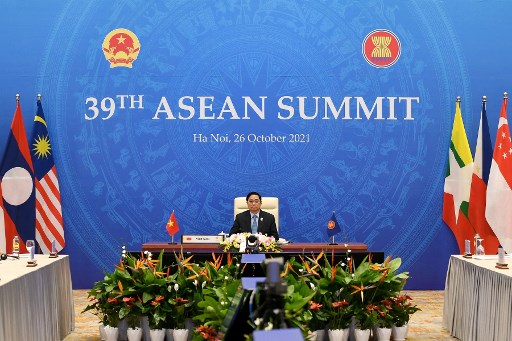
by Hakim S. Hayat
BANDAR SERI BEGAWAN, Brunei (AFP) — Myanmar’s junta boycotted a Southeast Asian summit Tuesday after its chief was banned from the event, deepening the regime’s isolation nine months after it took power in a bloody coup.
The virtual gathering kicked off three days of meetings hosted by the Association of Southeast Asian Nations (ASEAN), with US President Joe Biden as well as Chinese and Russian leaders set to attend.
Myanmar topped the agenda of Tuesday’s talks between regional leaders, with the country still in chaos following February’s military takeover and the subsequent deadly crackdown on dissent.
Facing calls to defuse the crisis, ASEAN — which includes Myanmar — has drawn up a roadmap aimed at restoring peace but there have been doubts over the junta’s commitment to the plan.
Its refusal to let a special envoy meet ousted civilian leader Aung San Suu Kyi prompted the bloc to bar junta chief Min Aung Hlaing from this week’s summit.
The coup snuffed out Myanmar’s short-lived experiment with democracy, with Nobel laureate Suu Kyi now facing a raft of charges in a junta court that could see her jailed for decades.
The 76-year-old, a thorn in the generals’ side for many years, was due to testify in court for the first time Tuesday in a closed-door hearing from which the media have been barred.
Min Aung Hlaing’s exclusion from the Southeast Asian summit was an unprecedented snub from an organisation often criticised for being toothless.
The junta slammed the decision as a breach of the bloc’s policy of non-interference in member states’ affairs.
The 10-member group invited a senior official from the junta-appointed foreign ministry in his place.
But the regime said on the eve of the meeting that sending a more junior figure would “affect our country’s sovereignty and image”.
At the opening of the summit, a big screen showed the leaders participating — but there just a blue display with the word “Myanmar” on it where the country’s representative was supposed to be.
Prime Minister Lee Hsien Loong of Singapore, among several ASEAN states that have spoken out strongly against the coup, lamented that “progress has been slow” following the Myanmar coup.
“This has real consequences for the people of Myanmar and ASEAN’s credibility as a rules-based organisation,” he told the summit, hosted by Brunei.
While some have hailed the decision to bar the junta chief as significant, observers think it unlikely the bloc will go further, such as by suspending Myanmar.
And they see little chance of decisions at this week’s meetings that could prompt a change of course from the junta.
“ASEAN is divided over the issue of Myanmar… There will unlikely be any real progress,” a Southeast Asian diplomat, speaking anonymously, told AFP.
A draft summit statement by the meeting’s chair, seen by AFP, “expressed concern” and “called on all parties concerned in Myanmar to implement their commitment to the ‘five-point consensus'”.
The “five-point consensus” is the plan drawn up by ASEAN to defuse the crisis.
It made no mention of Myanmar’s absence from the meeting, as it was drafted before the summit started.
South China Sea concerns
The draft statement also said concerns were raised about “serious incidents” in the South China Sea — where Beijing and several Southeast Asian states have overlapping claims.
It said those incidents “may undermine peace, security, and stability in the region”, using language common in ASEAN communiques that pointedly avoid naming specific countries.
This year’s meetings, run by member-nation Brunei, are taking place online due to virus-related travel difficulties.
After the Southeast Asian leaders’ talks Tuesday, Biden will take part in a US-ASEAN summit later in the day.
Biden will also participate in a summit including Chinese Premier Li Keqiang and other world leaders Wednesday.
It is the first time in four years that a US president has attended the ASEAN summits, as Biden seeks to rally support in the region against a rising China.
© Agence France-Presse







